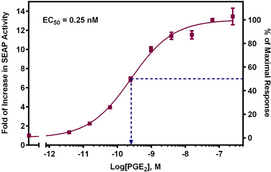Territorial Availability: Available through Bertin Technologies only in France
- Correlated keywords
- luminescence HEK-293T HEK-293T/17 HEK-293T-17
- Product Overview:
Prostaglandin E2 (PGE2) is one of the most important biologically active prostanoids which exerts its actions mainly by binding to four distinct E-type prostanoid receptors: EP1, EP2, EP3, and EP4. These four G protein-coupled receptors (GPCRs) exhibit differences in signal transduction mechanisms, tissue localization, and regulation of expression. EP4 receptors are highly expressed in the intestine, but are found in lower levels in the lung, kidney, thymus, uterus, and brain. The receptors are primarily coupled to Gs to stimulate the cAMP second messenger signal transduction pathway. EP4 receptors play important roles in relaxation of smooth muscle, gastric acid secretion, intestinal epithelial transportation, adrenal aldosterone secretion, uterine functions, bone formation, bone resorption, immunity, and inflammation. They have been suggested to involve in colorectal carcinogenesis, neuroprotection in excitotoxic brain injury, and cardiac hypertrophy. The diverse effects of PGE2 via EP4 receptors point to the need to identify novel agonists, antagonists, and modulators, both to further elucidate the function of this receptor subtype and for use as therapeutics for various diseases.
Cayman Chemical’s mission is to help make research possible by supplying scientists worldwide with the basic research tools necessary for advancing human and animal health. Our utmost commitment to healthcare researchers is to offer the highest quality products with an affordable pricing policy.
Our scientists are experts in the synthesis, purification, and characterization of biochemicals ranging from small drug-like heterocycles to complex biolipids, fatty acids, and many others. We are also highly skilled in all aspects of assay and antibody development, protein expression, crystallization, and structure determination.
Over the past thirty years, Cayman developed a deep knowledge base in lipid biochemistry, including research involving the arachidonic acid cascade, inositol phosphates, and cannabinoids. This knowledge enabled the production of reagents of exceptional quality for cancer, oxidative injury, epigenetics, neuroscience, inflammation, metabolism, and many additional lines of research.
Our organic and analytical chemists specialize in the rapid development of manufacturing processes and analytical methods to carry out clinical and commercial GMP-API production. Pre-clinical drug discovery efforts are currently underway in the areas of bone restoration and repair, muscular dystrophy, oncology, and inflammation. A separate group of Ph.D.-level scientists are dedicated to offering Hit-to-Lead Discovery and Profiling Services for epigenetic targets. Our knowledgeable chemists can be contracted to perform complete sample analysis for analytes measured by the majority of our assays. We also offer a wide range of analytical services using LC-MS/MS, HPLC, GC, and many other techniques.
Accreditations
ISO/IEC 17025:2005
ISO Guide 34:2009
Cayman is a leader in the field of emerging drugs of abuse, providing high-purity Schedule I-V Controlled Substances to federally-licensed laboratories and qualified academic research institutions for forensic analyses. We are certified by ACLASS Accreditation Services with dual accreditation to ISO/IEC 17025:2005 and ISO Guide 34:2009.





